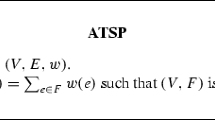Abstract
Given a metric graph G = (V,E) of n vertices, i.e., a complete graph with an edge cost function c:V ×V →ℝ ≥ 0 satisfying the triangle inequality, the metricity degree of G is defined as \(\beta=\max_{x,y,z \in V} \big\{ \frac{c(x,y)}{c(x,z)+c(y,z)}\big\} \in \big[\frac{1}{2},1\big]\). This value is instrumental to establish the approximability of several NP-hard optimization problems definable on G, like for instance the prominent traveling salesman problem, which asks for finding a Hamiltonian cycle of G of minimum total cost. In fact, this problem can be approximated quite accurately depending on the metricity degree of G, namely by a ratio of either \(\frac{2-\beta}{3(1-\beta)}\) or \(\frac{3\beta^2}{3 \beta^2-2\beta+1}\), for \(\beta < \frac{2}{3}\) or \(\beta \geq \frac{2}{3}\), respectively. Nevertheless, these approximation algorithms have O(n 3) and O(n 2.5 log1.5 n) running time, respectively, and therefore they are superlinear in the Θ(n 2) input size. Thus, since many real-world problems are modeled by graphs of huge size, their use might turn out to be unfeasible in the practice, and alternative approaches requiring only O(n 2) time are sought. However, with this restriction, all the currently available approaches can only guarantee a 2-approximation ratio for the case β= 1, which means a \(\frac{2\beta^2}{2\beta^2-2\beta+1}\)-approximation ratio for general β< 1. In this paper, we show how to enhance –without affecting the space and time complexity– one of these approaches, namely the classic double-MST heuristic, in order to obtain a 2β-approximate solution. This improvement is effective, since we show that the double-MST heuristic has in general a performance ratio strictly larger that 2 β, and we further show that any re-elaboration of the shortcutting phase therein provided, cannot lead to a performance ratio better than 2β.
Preview
Unable to display preview. Download preview PDF.
Similar content being viewed by others
References
Arora, S.: Polynomial time approximation schemes for Euclidean traveling salesman and other geometric problems. J. ACM 45(5), 753–782 (1998)
Böckenhauer, H.-J., Hromkovič, J., Klasing, R., Seibert, S., Unger, W.: Approximation algorithms for the TSP with sharpened triangle inequality. Information Processing Letters 75, 133–138 (2000)
Burkard, R.E., Deineko, V.G., Woeginger, G.J.: The travelling salesman and the pq-tree. Mathematics of Operations Research 23(3), 613–623 (1998)
Christofides, N.: Worst-case analysis of a new heuristic for the traveling salesman problem. Technical report, Graduate School of Industrial Administration, Carnegy–Mellon University (1976)
Deineko, V.G., Tiskin, A.: Fast minimum-weight double-tree shortcutting for metric TSP. In: Demetrescu, C. (ed.) WEA 2007. LNCS, vol. 4525, pp. 136–149. Springer, Heidelberg (2007)
Drake Vinkemeier, D.E., Hougardy, S.: A linear-time approximation algorithm for weighted matchings in graphs. ACM Transactions on Algorithms 1(1), 107–122 (2005)
Gabow, H.N.: An efficient reduction technique for degree-constrained subgraph and bidirected network flow problems. In: Proc. of the 15th Annual ACM Symp. on Theory of Computing (STOC), pp. 448–456 (1983)
Gabow, H.N., Tarjan, R.E.: Faster scaling algorithms for general graph-matching problems. J. ACM 38(4), 815–853 (1991)
Papadimitriou, C.H., Vempala, S.: On the approximability of the traveling salesman problem. Combinatorica 26(1), 101–120 (2006)
Reinelt, G.: TSPLIB library, University of Heidelberg, http://www.iwr.uni-heidelberg.de/groups/comopt/software/tsplib95/
Tan, X.: Approximation algorithms for the watchman route and zookeeper’s problems. Discrete Applied Mathematics 136(2-3), 363–376 (2004)
Author information
Authors and Affiliations
Editor information
Editors and Affiliations
Rights and permissions
Copyright information
© 2008 Springer-Verlag Berlin Heidelberg
About this paper
Cite this paper
Bilò, D., Forlizzi, L., Proietti, G. (2008). Approximating the Metric TSP in Linear Time. In: Broersma, H., Erlebach, T., Friedetzky, T., Paulusma, D. (eds) Graph-Theoretic Concepts in Computer Science. WG 2008. Lecture Notes in Computer Science, vol 5344. Springer, Berlin, Heidelberg. https://doi.org/10.1007/978-3-540-92248-3_5
Download citation
DOI: https://doi.org/10.1007/978-3-540-92248-3_5
Publisher Name: Springer, Berlin, Heidelberg
Print ISBN: 978-3-540-92247-6
Online ISBN: 978-3-540-92248-3
eBook Packages: Computer ScienceComputer Science (R0)




